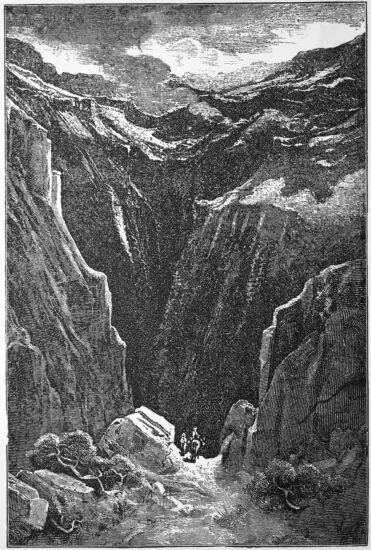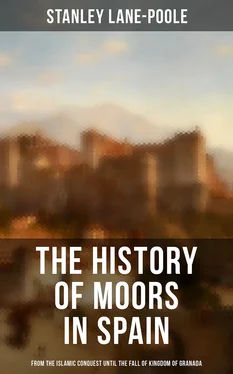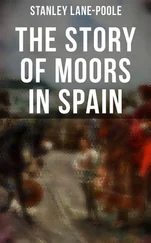Stanley Lane-Poole
The History of Moors in Spain: From the Islamic Conquest until the Fall of Kingdom of Granada
The Last of the Goths, Wave of Conquest, People of Andalusia, Holy War…
Published by
 Books
Books
Advanced Digital Solutions & High-Quality eBook Formatting
musaicumbooks@okpublishing.info2018 OK Publishing ISBN 978-80-272-4110-1
Preface.
The Last of the Goths
The Wave of Conquest
The People of Andalusia
A Young Pretender
The Christian Martyrs
The Great Khalif
The Holy War
The City of the Khalif
The Prime Minister
The Berbers in Power
My Cid the Challenger
The Kingdom of Granada
The Fall of Granada
Bearing the Cross
Chronological Table
 THE ALPUXARRAS.
THE ALPUXARRAS.
Table of Contents
The history of Spain offers us a melancholy contrast. Twelve hundred years ago, Tarik the Moor added the land of the Visigoths to the long catalogue of kingdoms subdued by the Moslems. For nearly eight centuries, under her Mohammedan rulers, Spain set to all Europe a shining example of a civilized and enlightened State. Her fertile provinces, rendered doubly prolific by the industry and engineering skill of her conquerors, bore fruit an hundredfold. Cities innumerable sprang up in the rich valleys of the Guadalquivir and the Guadiana, whose names, and names only, still commemorate the vanished glories of their past. Art, literature, and science prospered, as they then prospered nowhere else in Europe. Students flocked from France and Germany and England to drink from the fountain of learning which flowed only in the cities of the Moors. The surgeons and doctors of Andalusia were in the van of science: women were encouraged to devote themselves to serious study, and the lady doctor was not unknown among the people of Cordova. Mathematics, astronomy and botany, history, philosophy and jurisprudence were to be mastered in Spain, and Spain alone. The practical work of the field, the scientific methods of irrigation, the arts of fortification and shipbuilding, the highest and most elaborate products of the loom, the graver and the hammer, the potter's wheel and the mason's trowel, were brought to perfection by the Spanish Moors. In the practice of war no less than in the arts of peace they long stood supreme. Their fleets disputed the command of the Mediterranean with the Fatimites, while their armies carried fire and sword through the Christian marches. The Cid himself, the national hero, long fought on the Moorish side, and in all save education was more than half a Moor. Whatsoever makes a kingdom great and prosperous, whatsoever tends to refinement and civilization, was found in Moslem Spain.
In 1492 the last bulwark of the Moors gave way before the crusade of Ferdinand and Isabella, and with Granada fell all Spain's greatness. For a brief while, indeed, the reflection of the Moorish splendour cast a borrowed light upon the history of the land which it had once warmed with its sunny radiance. The great epoch of Isabella, Charles V., and Philip II., of Columbus, Cortes, and Pizarro, shed a last halo about the dying moments of a mighty State. Then followed the abomination of desolation, the rule of the Inquisition, and the blackness of darkness in which Spain has been plunged ever since. In the land where science was once supreme, the Spanish doctors became noted for nothing but their ignorance and incapacity, and the discoveries of Newton and Harvey were condemned as pernicious to the faith. Where once seventy public libraries had fed the minds of scholars, and half a million books had been gathered together at Cordova for the benefit of the world, such indifference to learning afterwards prevailed, that the new capital, Madrid, possessed no public library in the eighteenth century, and even the manuscripts of the Escurial were denied in our own days to the first scholarly historian of the Moors, though himself a Spaniard. The sixteen thousand looms of Seville soon dwindled to a fifth of their ancient number; the arts and industries of Toledo and Almeria faded into insignificance; the very baths—public buildings of equal ornament and use—were destroyed because cleanliness savoured too strongly of rank infidelity. The land, deprived of the skilful irrigation of the Moors, grew impoverished and neglected; the richest and most fertile valleys languished and were deserted; most of the populous cities which had filled every district of Andalusia fell into ruinous decay; and beggars, friars, and bandits took the place of scholars, merchants, and knights. So low fell Spain when she had driven away the Moors. Such is the melancholy contrast offered by her history.
Happily we have here only to do with the first of these contrasted periods, with Spain in her glory under the Moors, not with Spain in her degradation under the Bourbons. We have endeavoured to present the most salient points in the eight centuries of Mohammedan rule without prejudice or extenuation, and while not neglecting the heroic characters and legends which appeal to the imagination of the reader, we have especially sought to give a clear picture of the struggle between races and creeds which formed the leading cause of political movement in mediæval Spain. The student who wishes to pursue the subject further than it has been possible to carry it in the limits of this volume should read the following authorities, to which we are deeply indebted. The most important is the late Professor Dozy's Histoire des Musulmans d'Espagne (4 vols., Leyden, 1861), and the same scholar's Récherches sur l'histoire et la littérature de l'Espagne pendant le moyen âge (2 vols., 3rd ed., Paris and Leyden, 1881). These works are full of valuable information presented in a form which, though somewhat fragmentary, is equally pleasing to the literary and the historical sense. Professor Dozy was an historian as well as an Orientalist, and his volumes are at once judicious and profound. Very useful, too, is Don Pasqual de Gayangos's translation of El-Makkary's History of the Mohammedan Dynasties in Spain (2 vols., London, 1843), which has been exposed to some needlessly acrimonious criticism by Professor Dozy and others on the score of certain minor inaccuracies, but which none the less deserves the gratitude of all students who would rather have half a loaf than no bread, and are glad to be able to read an Arabic writer, even imperfectly, in a European tongue. Don Pasqual's notes, moreover, present a mass of valuable material which can be obtained nowhere else. Beyond these two authorities there are many Arabic historians, whose works have been consulted in the composition of the present volume, but who can hardly be recommended to the general student, as very few of them have found translators. A slight but very readable and instructive sketch of Arab civilization, with a glance at the Spanish development, is found in August Bebel's Die Mohammedanisch-arabische Kulturperiode (Stuttgart, 1884). For the last days of the Moorish domination, Washington Irving's picturesque Conquest of Granada , and Sir W. Stirling Maxwell's admirable Don John of Austria , largely drawn upon in this volume, deserve separate reading. All histories of the Moors written before the works of Gayangos and Dozy should be studiously avoided, since they are mainly founded upon Conde's Dominacion de los Arabes in España , a book of considerable literary merit but very slight historical value, and the source of most of the errors that are found in later works. Whether it has been in any degree the foundation of Miss Yonge's Christians and Moors in Spain (the only popular history of this period in English of which I have heard), I cannot determine: for a glance at her pages, while exciting my admiration, showed me that her book was written so much on the lines which I had drawn for my own work that I could not read it without risk of involuntary imitation.
Читать дальше

 Books
Books THE ALPUXARRAS.
THE ALPUXARRAS.










